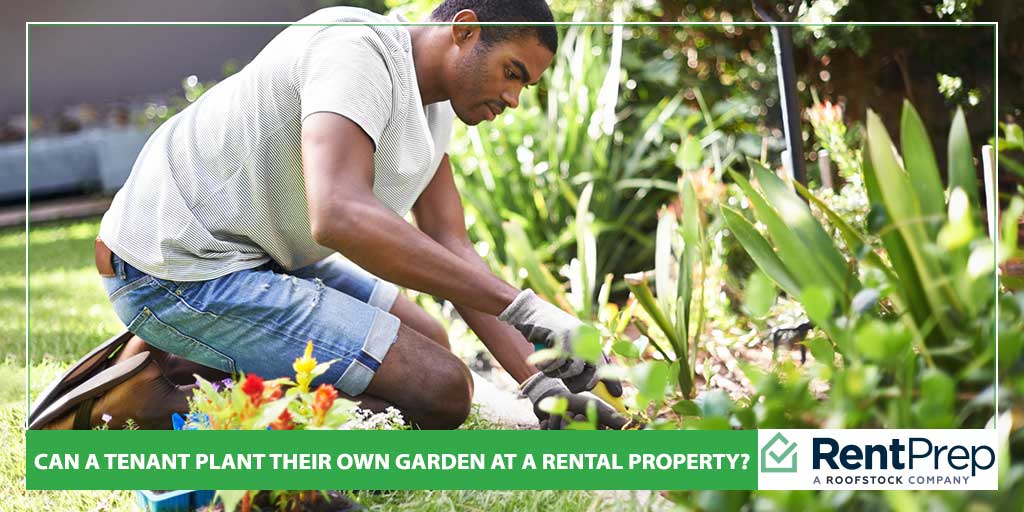
In the spring when the weather warms, everyone with a green thumb starts getting the itch to plant things and spend time outdoors in the dirt. When it comes to gardening, landlords and tenants often encounter tension on what exactly is allowed on the rental property.
While tenants may want to put in a garden and reap the benefits–including growing their own food and making the place more homelike–landlords might disagree. Landlords are mostly interested in protecting their investment from damage and changes, even a garden. While some landlords may not mind at all, other landlords might be extremely opposed to a tenant taking a shovel and digging up the backyard.
When it comes to a vegetable garden, tenants and landlords need to communicate and compromise in order to make both parties happy.
What Does The Law Say?

Tenants are not allowed to alter or change the landscaping of a rental property without the landlord’s permission, but what about putting in a garden?
The law supports landlords in determining that any alteration to the landscape, even with the intent to improve it, is not allowed without express permission. Many tenants might argue that a garden is an improvement to the property and may even add value. When it comes to putting in a garden, however, landlords have the law on their side, and any tenant who starts digging is violating the lease agreement.
It’s a good idea to emphasize in the lease agreement that any changes to the landscape of the property is a violation of the lease agreement, even if it may seem like an improvement, such as planting a tree, cutting down trees or shrubs or putting in a garden. The clearer you are in the lease agreement, the less likely your tenant is to misunderstand.
Room for Compromise
As a landlord seeking to enhance the property and make it a nice place for your tenant to live, consider compromising when your tenant is asking you for a garden. There are several options besides simply letting your tenant do whatever they want when it comes to a vegetable garden.
Here are three ideas for small to moderate gardens that would satisfy a tenant and not alter the rental property too much for the landlord.
Compromise #1. Flower bed garden
If the rental property has flower beds near the house or in the yard, consider letting the tenant use these areas as a garden. Because they are already part of the landscape, it’s not a big deal for the tenant to prepare the ground for planting. Even if you already have flowers or shrubs there, you could allow the tenant to use space in between, or forego planting flowers so the tenant can have that space.
Once the tenant moves out, it’s not hard to reclaim that space for flowers once again. If you don’t want to allow all your flowerbed space for a tenant’s garden, consider designating one or two at least.
Compromise #2. Container garden
Container gardens are just what they sound like, fruits and vegetables grown in large containers. Tubs, pots, barrels and more can house flowers and food in a limited space. Perfect for the small yard, balcony or rental property, container gardening is never permanent, but can satisfy a tenant’s desire for a garden.
Work with the tenant on container gardening by allowing containers along the sunny side of the yard along the fence or agree to install a window box or hanging basket. With the right combinations, container plants can enhance the property’s curb appeal and make your tenant very happy without too many permanent changes.
Compromise #3. Allow a garden on your terms
If you don’t mid allowing the tenant to put in a garden, make sure that you have very clear communication about your expectations. Specify where the garden will be, taking into consideration the sunlight and shade of the property. Be detailed about the size you’ll allow and any fast-growing invasive species you don’t want, like mint.
Whatever compromise you agree to, make sure that you put it all in writing. Include information like who will do the work, what materials the tenant may use to do the work, specify how the tenant will remove the work if necessary, and any other relevant details for your particular situation.
Pros and Cons of Tenant Gardens

A garden can be a real asset when it comes to keeping a tenant happy, and as a landlord, you may even be the beneficiary of a particularly productive zucchini or tomato plant. It may be worth it to allow a good tenant to invest something of themselves into the rental property to foster a greater sense of responsibility for the place.
Many municipalities have regulations about gardens on private property, so make sure before you or your tenant break ground that you are following your city’s laws on gardens. For example, many cities don’t allow gardens in the front yard of a property, while other cities are passing increasingly restrictive codes about landscaping choices in general, and gardens specifically. If the tenant fails to tend the garden, it could potentially decrease the property value and cause you to receive a citation from the city.
When it comes down to allowing a tenant to have a garden or not, you simply need to look at all the factors in the decision, from the type of tenant you have to what your property might allow without too much trouble, and what your city regulations are when it comes to gardening and landscaping.
Have you ever had a tenant ask you about putting in a garden? What did you decide to do and why? Please share this article and let us know your experiences in the comments section below.

